Dec 09, 2024 – Dharma Q&A for Leading Members, Happy Dialogue (14) Cheongju
Good morning. A new day has dawned at the Seoul Jungto Center.
After completing his morning prayer and meditation, Sunim began the Dharma Q&A for leading members at 10 AM for the daytime group. This monthly gathering allows leading members to discuss with Sunim the challenges they face while engaging in Jungto Society activities.
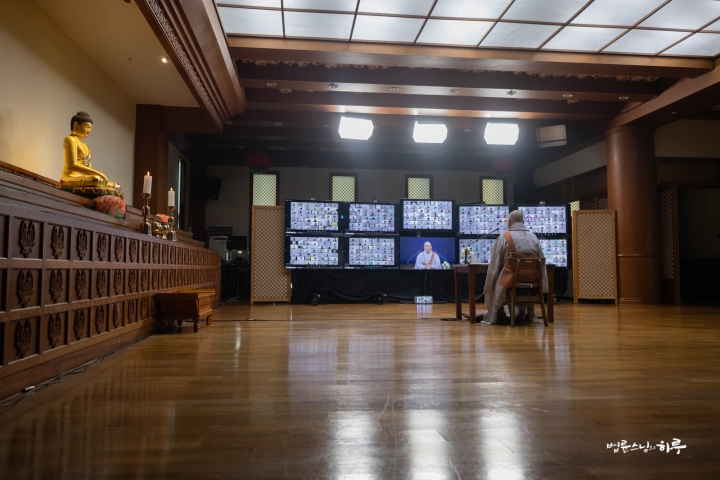
Once all the leading members had joined the video conference, Sunim greeted them.
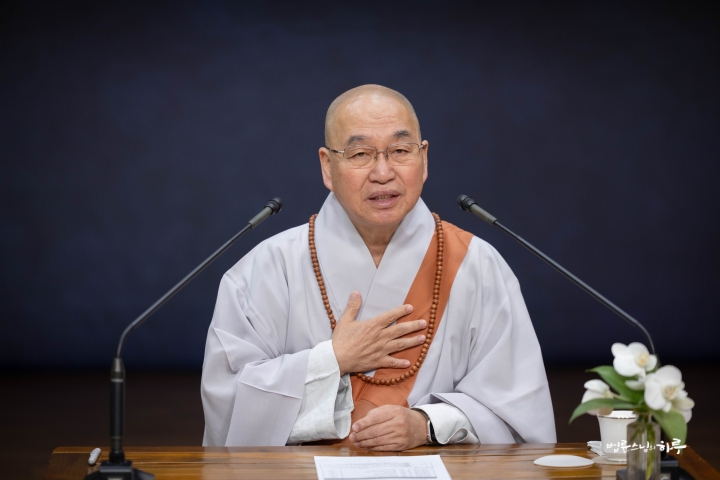
“Since the night of December 3rd, our society has been in turmoil, and I imagine you all have many concerns and worries. However, unexpected events are a constant in our lives. I believe that the practice taught by the Buddha is about how we maintain inner peace and respond proactively when such unforeseen circumstances arise.”
After explaining in detail the plans to revitalize the Jungto Social and Cultural Center and the purpose and background of Venerable Pomnyun Sunim’s proposed 100-day Dharma talks scheduled for the first half of next year, the dialogue began.
Given the current unsettled state of affairs, questions arose about the chaotic situation of the past week, starting with the declaration of martial law. Answering these questions quickly consumed an hour.
Today is the regular Posadhā day for leading members. Finally, Sunim explained why practitioners should observe Posadhā.
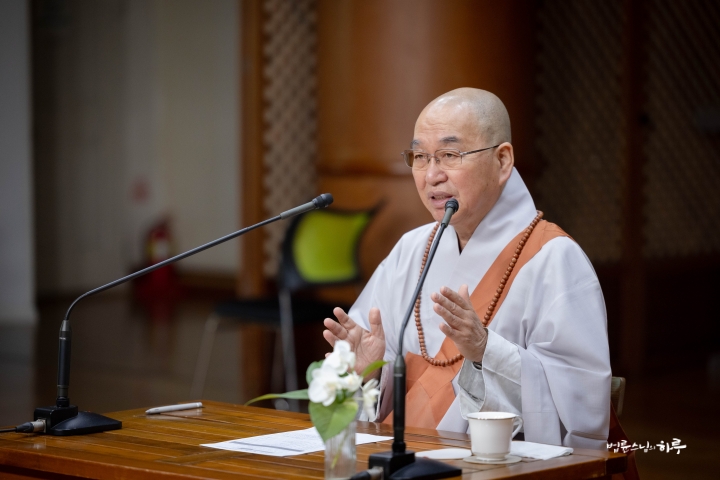
“When you become a leading member of Jungto Society, you participate in Posadhā quarterly. In our Jungto practice community, we engage in repentance through three methods. First, we consider it repentance when we become aware of our own mistakes. Self-awareness is crucial in repentance; recognizing and reflecting on our errors by thinking, ‘I did this wrong,’ is what we call repentance.
Second, when we live with others rather than alone, relationship issues arise. In relationships, even if we recognize our mistakes, the other person may not know that we’ve realized them. So we need to inform them. By telling others, ‘I made this mistake, and I’ve realized it and am reflecting on it,’ we dispel doubts like ‘Why does this practitioner break precepts?’ This deepens mutual trust, and we call this process Posadhā. Posadhā is openly confessing to our fellow practitioners.
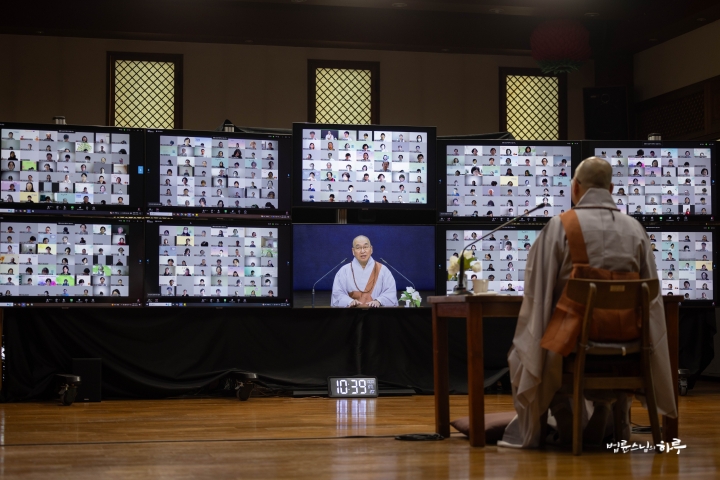
Sharing our feelings is similar. To share our feelings, we must first be aware of our current emotional state. This is called ‘mindfulness,’ ‘sati,’ ‘awareness,’ or ‘self-awareness.’ If we lived alone, self-awareness would be enough, but since we live with fellow practitioners, we need to communicate our emotional state to others. This is necessary for building good relationships. Sharing our feelings means revealing and communicating the state of our mind.
Third, Posadhā is possible when we recognize our own mistakes, but there may be times when we don’t. In such cases, we should ask others for help in recognizing what we’ve missed. We can ask, “How did I appear to you?” By requesting this assistance and responding with “Ah, I see,” we become aware of ourselves. This is called ‘Jaja.’ Posadhā and Jaja can only be practiced when one has reached a certain level of practice and established relationships with fellow practitioners. It’s not possible to do this with people we don’t have a connection with.
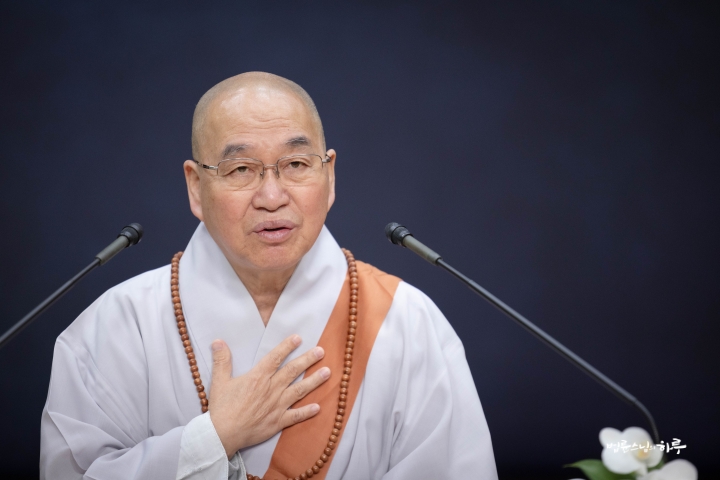
Repentance is only possible with mindfulness, and mindfulness is the core of practice. To strengthen trust in relationships with fellow practitioners, we should regularly share our thoughts and conduct posadhā according to the precepts. When we become aware of our shortcomings, errors, or mistakes and share them with our fellow practitioners, firstly, we deepen our practice. Secondly, our relationships with fellow practitioners become stronger. This is the goal of posadhā. Now, let’s begin the posadhā.”
Following this, the leading members conducted a posadhā assembly where they repented and shared their words and actions according to the precepts.
After lunch, Sunim packed for an overseas trip. He needed to depart for the Philippines by plane that night.
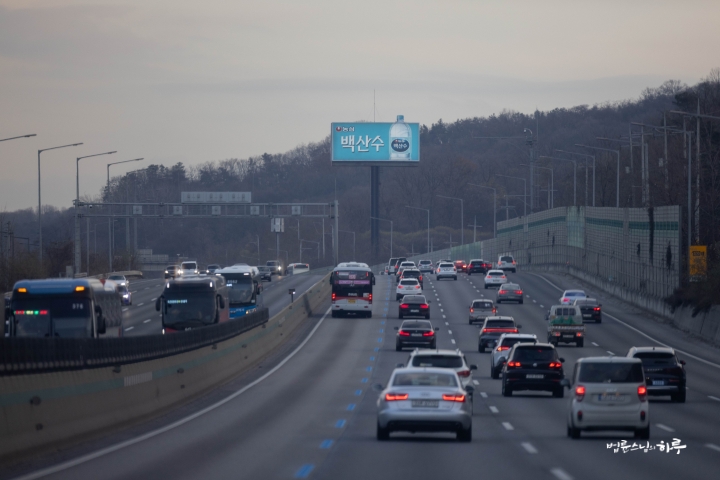
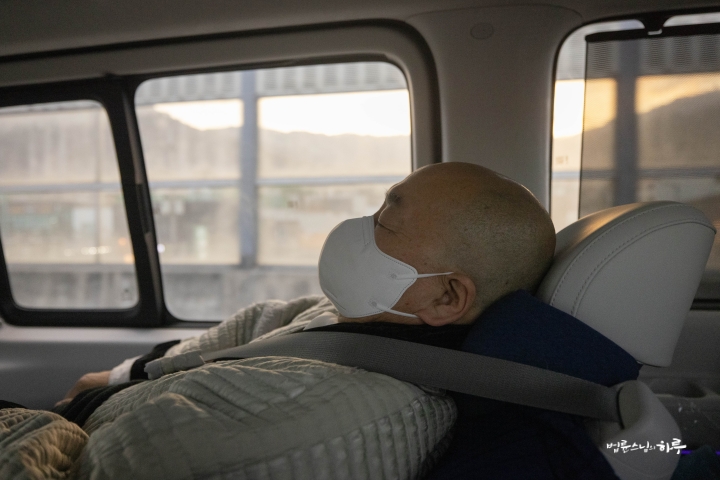
Departing from Seoul at 4:30 PM, he headed towards Cheongju. After a two-hour drive on the highway, he arrived at the lecture venue at 6:30 PM.
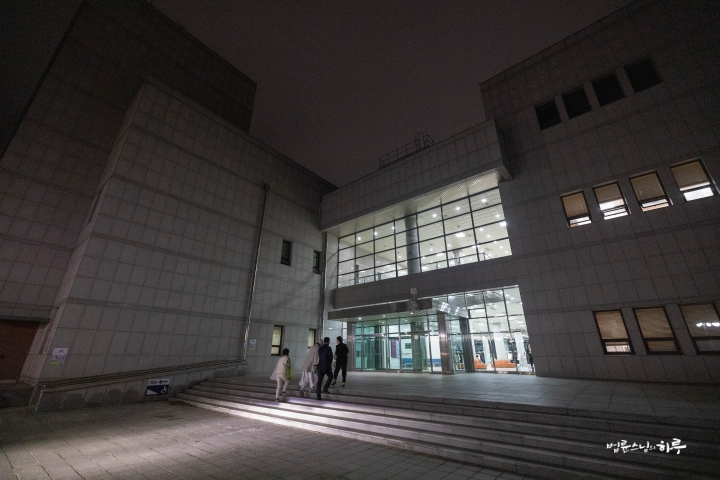
Today’s lecture is being held at the Gaesin Cultural Center of Chungbuk National University. As Sunim arrived at the venue, about 50 Happiness Citizens from the Cheongju Happiness Center were welcoming attendees at various locations.
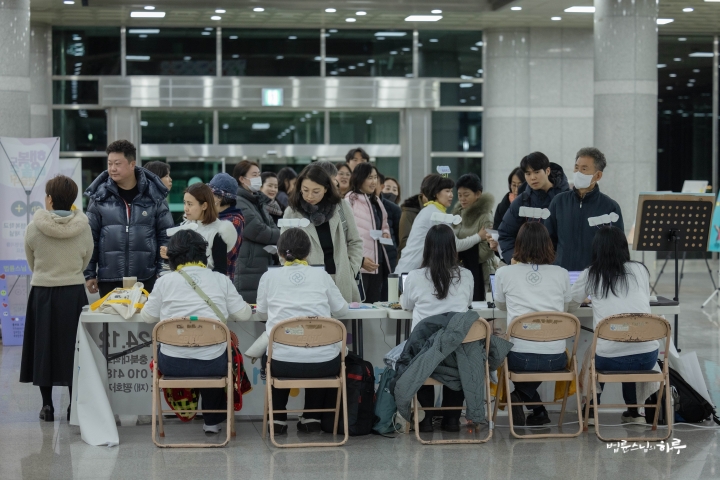
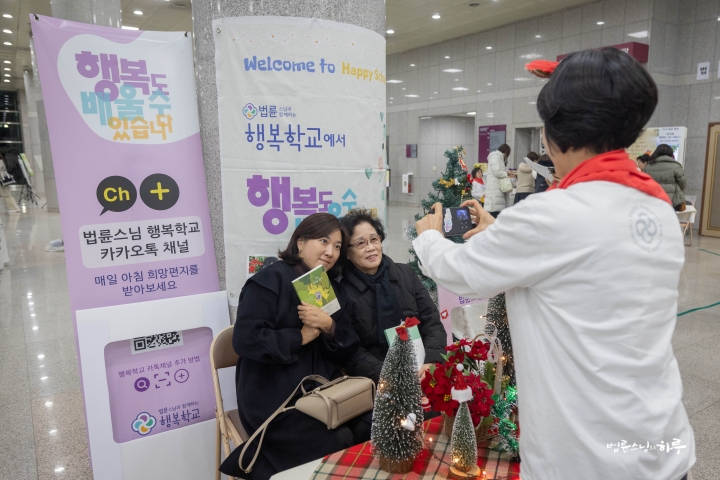
After greeting the volunteers, Sunim headed straight to the auditorium. The lecture began with beautiful songs by the busking performance team ‘Zero’.
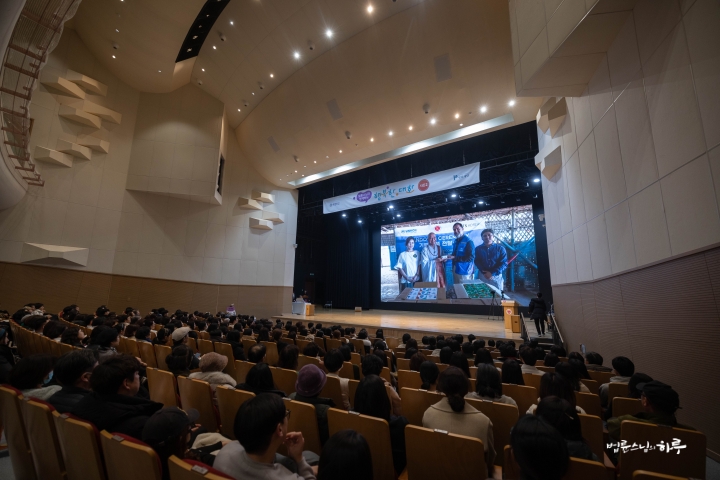
Next, a video was shown of Sunim’s visit to the Rohingya refugee camp last week, where he delivered 6 million bars of soap. As the video ended, Sunim walked onto the stage amidst cheers and applause. The first and second floors were filled with about 700 audience members.
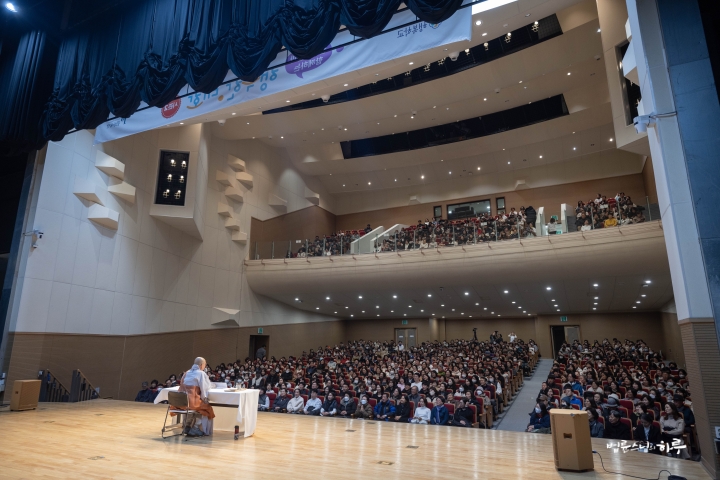
Sunim began by greeting the citizens of Cheongju.
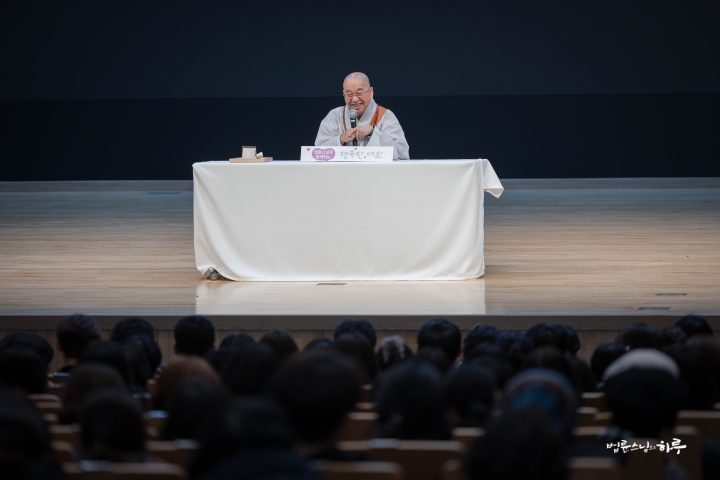
“The weather has gotten much colder, hasn’t it? But isn’t winter supposed to be cold? Moreover, with the current social unrest, I imagine many of you have been losing sleep watching TV. In a way, it’s a terribly unfortunate situation, but isn’t the news these days more entertaining than ever? It’s like a comedy – you laugh, but then you wonder how things could be so sloppy. But isn’t it good that it’s so sloppy? If they had prepared well, it could have been a disaster. So, don’t be too fond of people who are good at everything. Sometimes it’s better to be incompetent. This is something we can learn from.
What’s happening now is more interesting than any drama series, so I suspect other TV channels’ ratings have dropped significantly. It’s embarrassing that such a thing happened in 21st century South Korea, but it’s also remarkable that it ended in just six hours. Looking at the process that followed, on one hand, we feel torn and concerned, but on the other hand, we’re curious every day, wondering how they did what they did, and it seems like an exposé more interesting than any drama series continues. Anyway, we have to live our lives day by day in this kind of society.
What’s particularly unfortunate is that our economy is not doing well, making life especially difficult for ordinary people. It’s not just the common people’s economy that’s suffering; when things are like this, the entire national economy becomes very difficult. If the current situation continues for too long, it creates uncertainty about Korea’s future in foreign relations, causing most diplomatic and economic relationships to be put on hold. Foreign heads of state who were planning to visit our country are all postponing their visits, and major national contracts are being delayed, which could have a significant long-term impact on our economy. These are the concerns we’re facing.
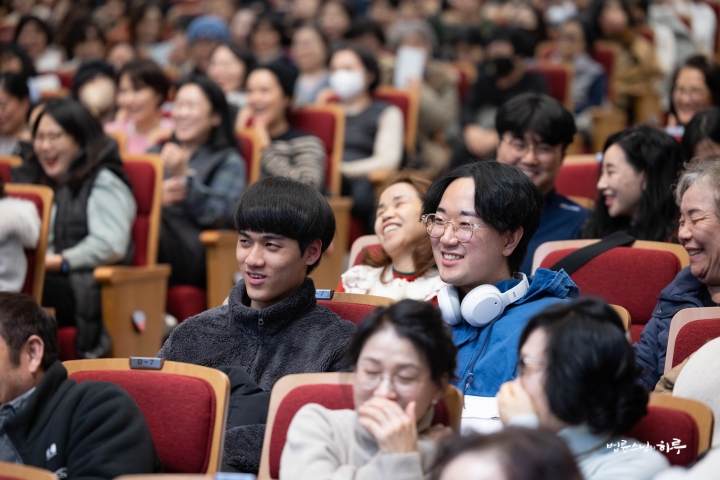
Looking back on the past 100 years, we have experienced foreign invasion and domination, division by external forces, war, oppression under dictatorial regimes, and economic growth despite poverty to join the ranks of developed nations. We have also resisted dictatorship to achieve democratization and improved inter-Korean relations, reaching a point where we could have some hope. Although we have now regressed to the brink of war, the situation has calmed somewhat since Trump’s election as U.S. president, and there is hope that relations may improve further next spring.
Life seems to progress day by day, with disasters occurring when things seem to be going well, and new hope arising in the midst of difficulties. I hope you will keep this in mind. As a democratic country, and with the current global popularity of Korean culture, our current situation is somewhat embarrassing to people from other countries. I share with you the hope that constitutional order will be restored quickly as we begin our conversation.”
Following this, five people who had submitted questions in advance engaged in dialogue with Sunim, after which impromptu questions were taken from the audience. One person sought Sunim’s advice, expressing concern that her husband was taking food from their son’s plate.
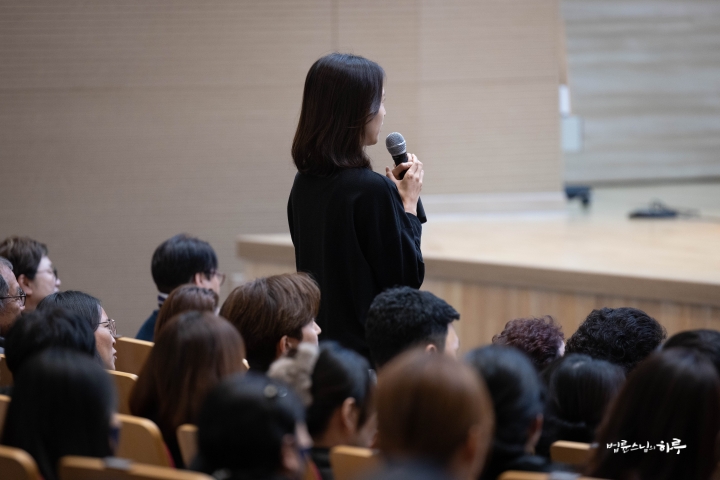
I’m Annoyed That My Husband Keeps Taking Food From Our Son’s Plate
“When you serve the food initially, instead of dividing it equally, give two-thirds to your husband and one-third to your son. This way, such incidents won’t occur. Your husband might even share some of his leftovers with your son. If that still doesn’t balance things out, don’t give any to your son and give it all to your husband. He’ll probably say, ‘Oh? There’s none for our son?’ and share some. Wouldn’t that be nice to see? Why make such a fuss over something so trivial? How old is your son?”
“He’s a first-year high school student.”
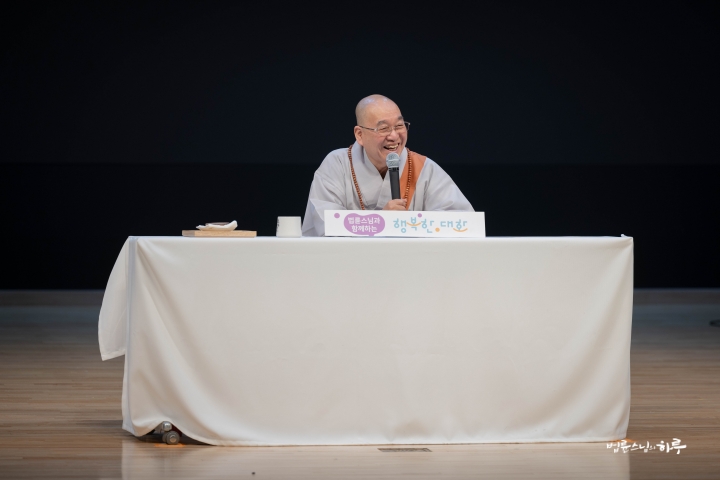
“Even though he’s a first-year high school student, he’s still an adolescent. While his food intake might be similar to an adult’s, the father probably eats more and the son less. Or perhaps the father eats faster while the son eats more slowly. You need to consider these factors when distributing food. If you have negative feelings towards your husband and affectionate feelings towards your son without properly assessing the situation, as you seem to, you might end up giving more to your son or less to your husband.
Also, considering the eating speeds, if your husband has finished while your son is still eating, your husband might think, ‘You can’t finish that. Let me help you,’ and take some food. In that case, why not view it as the father and son sharing food instead of saying he’s taking it? First, you could try changing your perspective and see it as sharing.
Second, if you still feel that your husband is taking food from your son’s plate, when serving, give all the food to your husband and none to your son. Or give a little to your son and more to your husband. Try this tomorrow morning. Then there will be nothing to take, so it won’t happen. This way, your husband is more likely to say, ‘Do you not have enough?’ and share even a spoonful. This is something you, as the person responsible for the kitchen, can easily adjust. If you’re still saying ‘My husband is annoying’ over this, it might suggest that you’re being a bit foolish.”
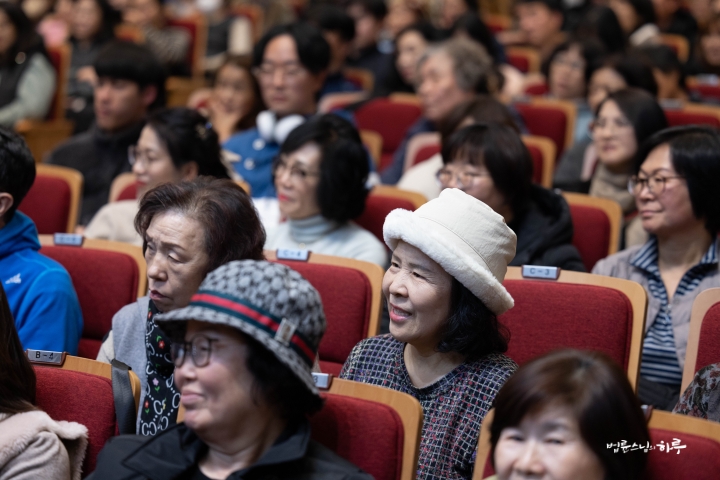
“I wish my son would eat more. I also give my husband as much food as my son.”
“If your husband is taking food from your son’s plate, it means he doesn’t have enough food. In that case, you should prepare more food.”
“If I make more food, my husband complains, asking if I’m throwing a party for the neighborhood.”
“Then you can just answer that you are throwing a party. Households become noisy because couples keep nitpicking about these small things. If there’s not enough food, make more. If you make too much and there are leftovers, keep the amount the same but adjust how you distribute it. You should be able to handle this appropriately. Why did you get married if you can’t even think of this?” (Laughter)
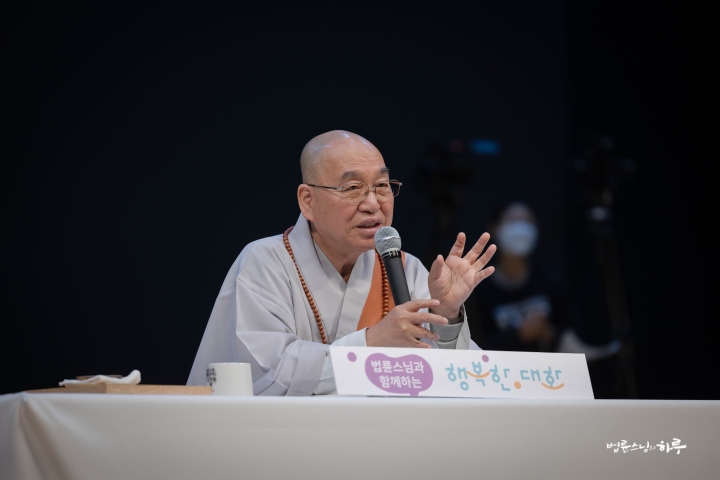
“If a child is skinny, it’s more likely due to digestive issues rather than eating too little. In the past, people thought that gaining weight while eating little meant good heat efficiency. But nowadays, with food being relatively abundant, we think that not gaining weight despite eating a lot means low heat efficiency. So, that’s actually a good thing.
This is a matter of perspective. Jesus said, ‘You see the speck in your neighbor’s eye, but do not notice the log in your own eye.’ When we’re in a bad mood and criticize others, we see even the tiniest speck, but when we want to cover up our own faults, we don’t even see a log. People we like seem flawless, while those we dislike seem full of faults. If you change your perspective a bit, there’s no problem at all. How can you say your husband is stealing food when the family is sitting together for a meal and he asks your son, ‘Are you full? Can I have some?’ Your way of thinking is the problem.”
“My son can definitely finish his food. That’s why my husband annoys me so much. But as you said, I’ll try to change my perspective and think about it again.”
“Starting tomorrow morning, give all the food to your husband and none to your son. The problem will solve itself.”
“Yes, thank you.”
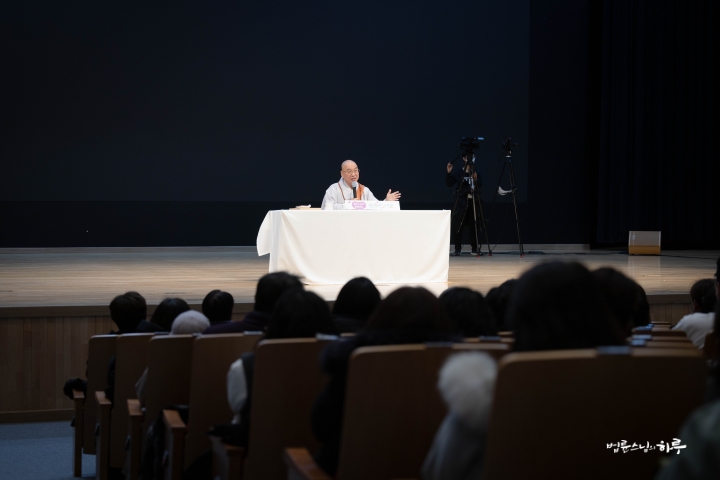
“Leave your son alone and keep telling your husband, ‘You need strength for work, so eat more.’ If your son tries to eat, say, ‘You don’t need to eat now. You can eat later if there’s anything left after your father eats.’ Keep doing this. This problem arises because you’re taking too much care of your son. If you stop caring for your son and start caring for your husband, who do you think your husband will naturally start caring for? He’ll start caring for your son.
No matter how annoying he is, your husband is your man, not your little son. When your son grows up, another woman will take him away. He’s only cute while you’re raising him, but you should know that your son will never be your man. It will take some time for you to realize this. Only after you marry him off and see what happens will you realize, ‘Oh, he wasn’t my man after all!'”
“Yes, thank you.”
The questions continued.
I’m not sure if what I want is endless career achievement. I’ve decided to pursue a Ph.D., but I’m worried because I’ve seen many people lose themselves by getting too immersed in work and research.
I graduated from engineering school and work at a research institute. It’s hard to write an improved performance report every year. My boss criticizes me for not multitasking. What should I do?
I’m worried about my high school freshman son who has lost motivation, is depressed, and says he wants to die. Please suggest alternatives to help my son find motivation and hope in life.
I had a crisis of faith in my job (as a welfare worker) when I couldn’t go to see my father who had collapsed because I had to take another elderly person to the hospital. It was really tough.
As a social worker, I’m wondering if I should bring my parents to the facility where I work. I’m worried if I can handle my mother’s personality. How should I relieve stress?
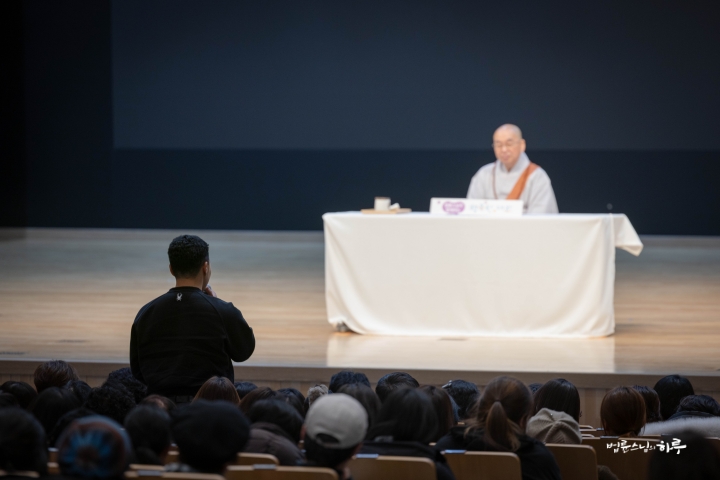
Many people at the venue wanted to ask more questions, but it was already 9 PM. Sunim gave his closing remarks.
“Various problems in life may seem big at first glance, but when you examine them closely one by one, they’re not a big deal. Having this perspective is most important. What could be such a big deal in life? For example, people say, ‘Oh no, I pooped my pants!’ Well, you can just clean up and wash. What’s the big deal? But when people exclaim, ‘Oh my! I pooped my pants!’ it becomes a big issue.
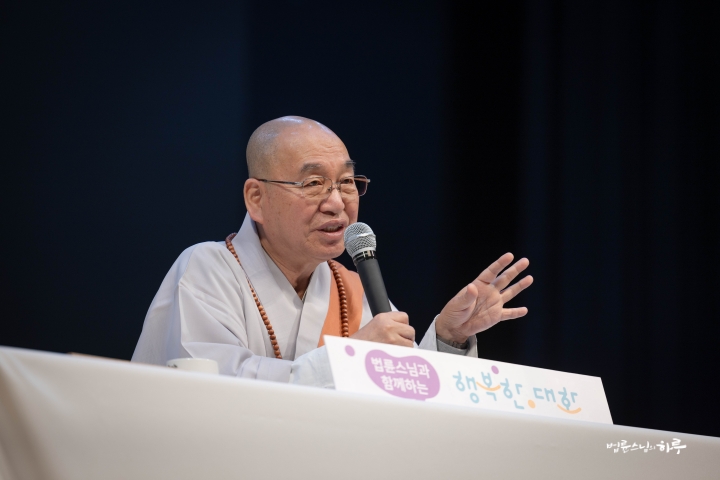
Being sick is not a big deal. If you’re sick, you can go to the hospital for treatment and examination. Do I do the treatment? Or does the doctor do it? The doctor does it, but people make a fuss as if they’re doing it themselves. So, all I need to do is take them to the hospital, and then it’s up to the doctor. But what if the doctor can’t help? Then there’s nothing we can do but die. There’s no other way. If the doctor can’t do it, who else can? If you try to do something the doctor can’t, you might end up falling prey to money-grabbing scammers, thinking, “Would a shaman ritual work?” or “Would a healing ceremony help?” When they ask for 10 million won or 20 million won, you might end up doing it out of desperation.
So, while we should do our best, we can’t have everything we want in life. Conversely, when others ask us for something, be it parents or children, we can’t fulfill all their wishes either. Since not everything I want can happen, I accept what does and let go of what doesn’t. Similarly, for what others want from me, I do what I can and simply say “I’m sorry” for what I can’t. There’s no other way. What other method could there be?
If you think this way, you’ll never fall for scams. Sunim always firmly says, “There’s no solution.” You should not to waste money or time unnecessarily and just accept things as they are. For example, if someone wants to hold a four-day funeral when the cemetery only allows three days, and the cemetery manager says it’s not possible, then it really isn’t possible. Is there a secret method to make the impossible possible? Is there a foolproof way to make it happen? Do you understand what I’m saying? (Laughs)
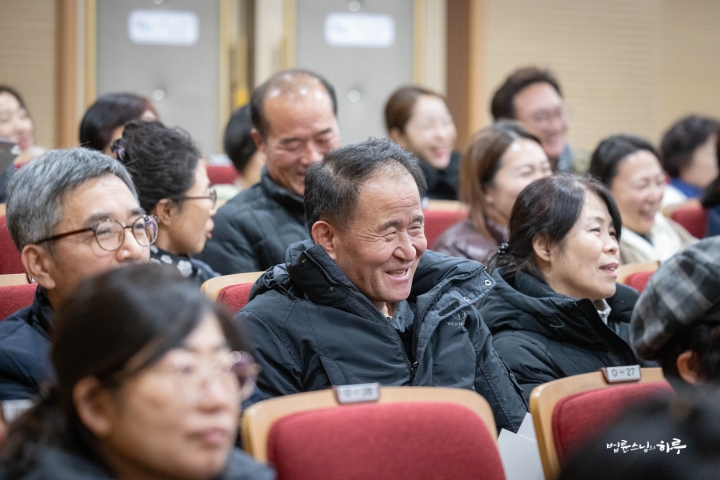
However, when using special methods, it costs a bit of money. Nothing is impossible. If you go to get your fortune told and they say, ‘Don’t go to such and such places,’ what happens if you say, ‘But I still need to go’? They give you a talisman. But it costs a bit. Do you understand?” (laughs) “So in those cases, you just need to spend a little money. But then people don’t want to spend money, so they come to me and ask, ‘Is that really true?’ I’m not the one who said it, but they come and ask me again. So I tell them, ‘Go ask that monk.’
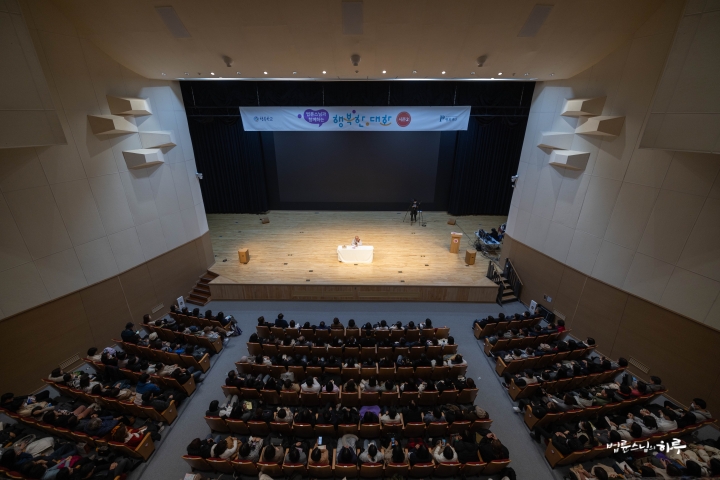
So, it’s always not a big deal. Thinking ‘This is really a big problem!’ is form (色). But ‘At first glance it seems like a big deal, but upon closer inspection, it’s not much at all’ – this is emptiness (空). At first glance, it seems like something is there, but when you look closely, there’s nothing. That’s why we say ‘form is emptiness.’ It’s not important to memorize such phrases, but to apply them in our lives and become free from our suffering.”
Sunim had to leave Cheongju by 9:30 PM at the latest to arrive at Incheon Airport in time for the flight departure. Regrettably, the conversation ended with a promise for next time.
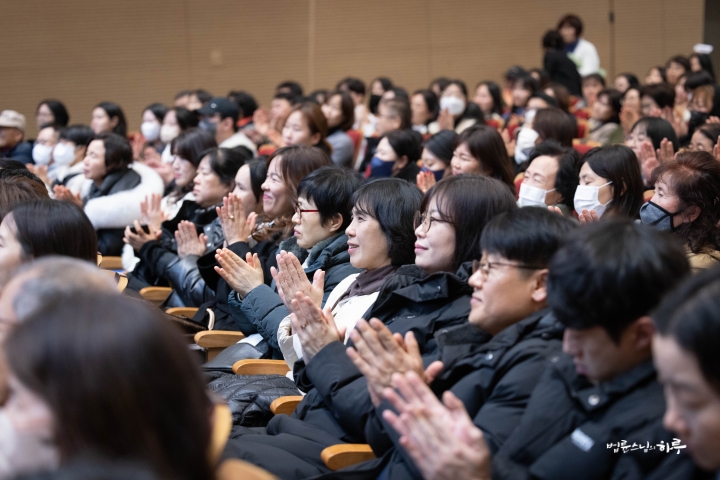
Immediately after, Sunim held a book signing session on stage. Many citizens lined up to greet him and express their gratitude.
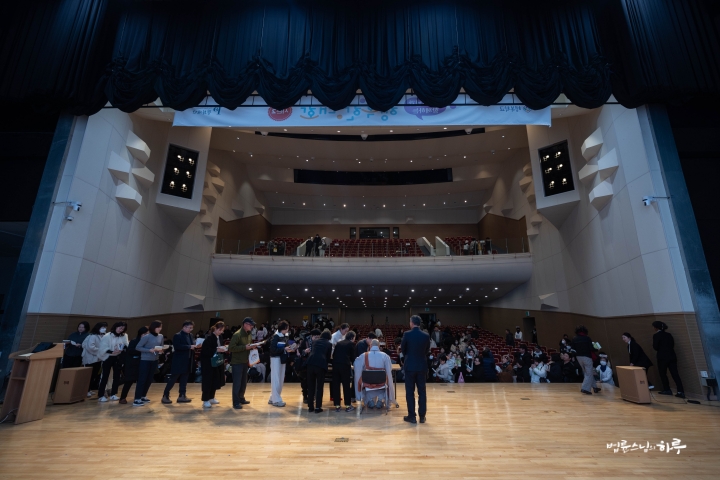
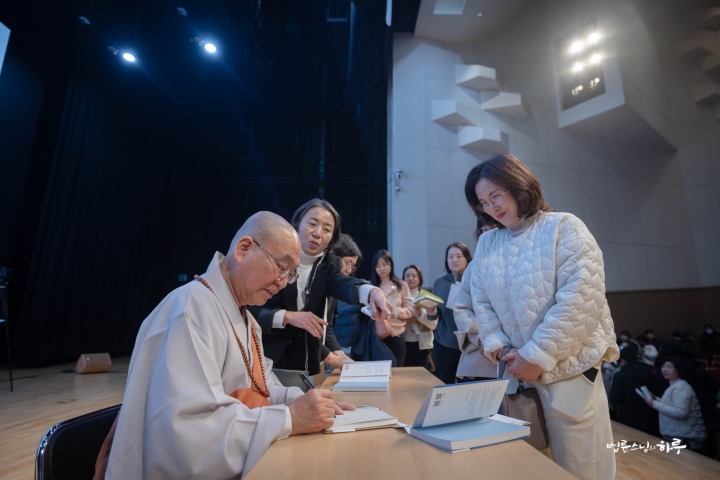
“Thanks to you, Sunim, I’ve become much happier. Thank you.”
Although it was time to leave, Sunim signed books for everyone in line until the end. While the signing was in progress, volunteers prepared to take group photos to ensure Sunim could depart as quickly as possible. Sunim hurriedly took a commemorative photo with the volunteers who had prepared for the lecture.
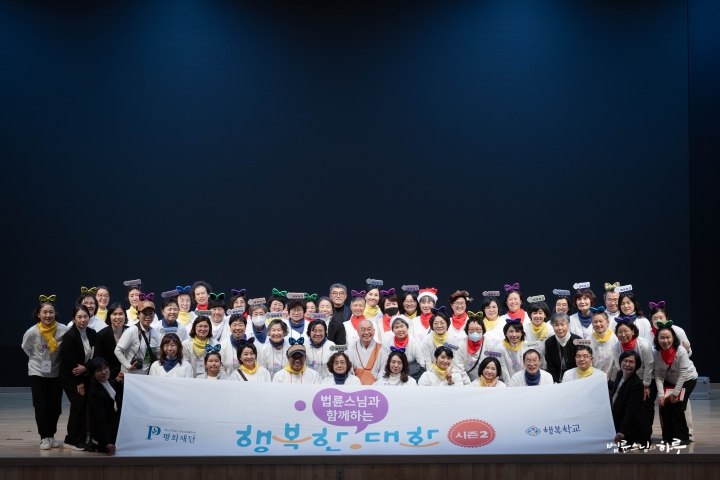
“Happy citizens, Cheongju!”
After expressing gratitude to the volunteers, Sunim quickly left the lecture hall and departed from Cheongju, heading straight to Incheon Airport.
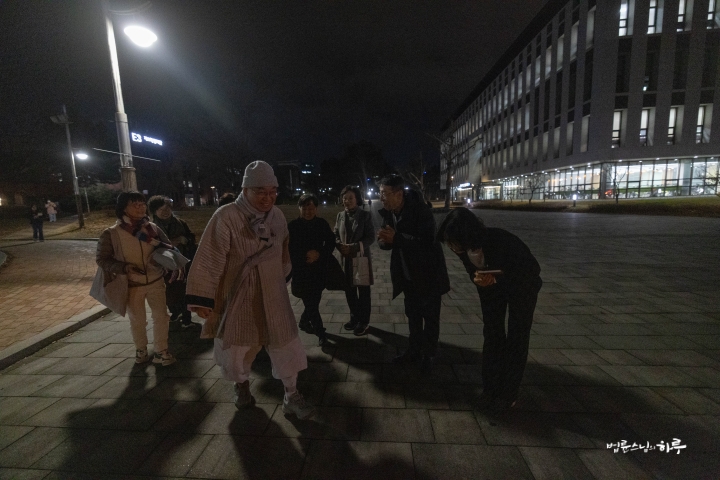

After a 2-hour and 30-minute drive, Sunim arrived at Incheon Airport at noon, hurriedly completed the departure procedures, and headed to the boarding gate.
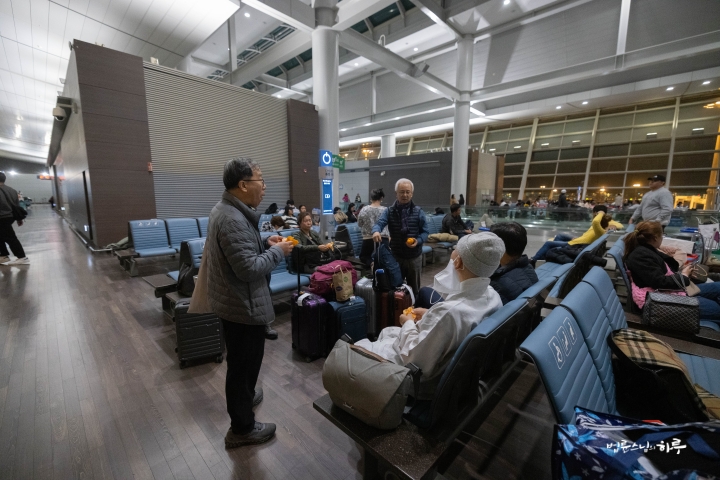
There was concern about possibly missing the flight, but fortunately, Sunim safely arrived at the boarding gate on time.
Tomorrow, Sunim will depart from Incheon Airport at 1:15 AM, take a short nap on the plane overnight, transfer at Manila Airport in the early morning, and then move to Cagayan de Oro Airport in Mindanao. After that, he is scheduled to attend inauguration ceremonies for schools for disabled children in two cities: Pangantucan and Kalilangan.




